|
|
|
Sort Order |
|
|
|
Items / Page
|
|
|
|
|
|
|
| Srl | Item |
| 1 |
ID:
165188


|
|
|
|
|
| Summary/Abstract |
Increasing attention paid to US casualties in far-flung places such as Tongo Tongo, Niger, and headlines claiming ‘secret wars’ have fueled discussion about American military’s involvement in Africa. Though the continent has been a part of the American way of war since the beginnings of the US – consider the early combat actions of US Marines in Tripoli –, current African conflicts are challenging our understanding of war and approaches to winning it. This article examines the ways America seeks to achieve its ends in Africa with a particular focus upon the last 10 years of US counter-terrorism and stability operations in Niger and the Sahel Region. The author proposes unifying American, Allied, and partner efforts through a strategy of Active Containment.
|
|
|
|
|
|
|
|
|
|
|
|
|
|
|
|
| 2 |
ID:
178523
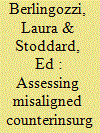

|
|
|
|
|
| Summary/Abstract |
While representing a major military threat in Niger and Nigeria, the two branches of the Islamic State West Africa Province (ISWAP-Liptako Gourma and ISWAP-Lake Chad) have increasingly sought to win popular support (distinguishing themselves from other groups in the region, especially Boko Haram). Yet, despite some improvements in the recent past, both Niger’s and Nigeria’s different counterinsurgency practices have not been sufficiently adapted to (and therefore remain strategically misaligned vis-à-vis) ISWAP’s more population-centric approach. Strategic rethinking and realignment of the still predominantly enemy-centric approaches of both states are essential so that ISWAP strategy can be countered in the long term.
|
|
|
|
|
|
|
|
|
|
|
|
|
|
|
|
| 3 |
ID:
141479


|
|
|
|
|
| Summary/Abstract |
In contrast to similar organizations in its neighbouring countries, Niger's domestic Salafi associations have remained peaceful and apolitical. Drawing on historical institutionalist scholarship and on recent conceptualizations of the state as a religious actor, this article examines how the Nigerien state has tried to regulate religious practices since Seyni Kountché's military coup in 1974. It argues that the institutional regulation of religious practices is one important variable that accounts for Niger's deviant trajectory. During Niger's autocratic period (1974–91), the government established the Association islamique du Niger (AIN) as the sole legal authority regulating access to Niger's Friday prayer mosques. Committed to peaceful and apolitical interpretations of the Koran, the AIN confined access to Niger's religious sphere to local clerics and Sufi brotherhoods. After the breakdown of autocratic rule in 1991, the AIN served as a religious advisory body. Salafi associations could assemble freely but had to abide by certain criteria. Confronted with the prospect of Islamic violence in 2000, the Nigerien state intervened in Niger's religious sphere in several ways. Among other initiatives, the government began to resurrect a more rigorous system of religious supervision in order to monitor religious practices on an ongoing basis.
|
|
|
|
|
|
|
|
|
|
|
|
|
|
|
|
| 4 |
ID:
167329
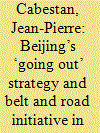

|
|
|
|
|
| Summary/Abstract |
In looking at the case of Niger, this article demonstrates that there have been a lot of similarities between China’s Belt and Road Initiative (BRI) launched in 2013 and its ‘going out’ strategy initiated in the late 1990s. Prior to 2013, many of the BRI’s objectives and strategies were already at work in Africa, and particularly in socioeconomically poor, landlocked countries that badly need infrastructure and connectivity. It also shows that China has been ready to invest in projects that are not necessarily profitable in the short term to consolidate its economic and diplomatic presence in the targeted country as well as to help its large state firms growing and internationalizing. It then demonstrates that although Niger did not belong in the initial group of countries targeted by the BRI, this initiative has contributed to deepening China’s economic and political influence in Niger, particularly to the detriment of France. Finally, this article highlights that both in Africa, particularly in the Sahel region, and in the BRI countries, China is facing emerging security challenges, continuing to mainly rely on others to overcome them.
|
|
|
|
|
|
|
|
|
|
|
|
|
|
|
|
| 5 |
ID:
120984
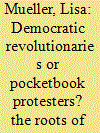

|
|
|
|
|
| Publication |
2013.
|
| Summary/Abstract |
This article investigates whether political or economic grievances were the main driver of the mass demonstrations in Niger in 2009-10, which occurred at a time of famine and the President's attempt to defy the constitution and seek a third term in office. Using original survey data from a quasi-random sample of Niamey residents, the article shows that low prospects of upward mobility are associated with a higher likelihood of protest participation, whereas opposition to the President's anti-constitutional politics is not. Membership in civic organizations is also associated with higher protest participation, but not because these groups are effective at framing the issues: what matters is the capacity of organizations to mobilize individuals. This suggests that civil society may have a galvanizing effect on citizens, even if efforts to win hearts and minds fail. The article concludes that the uprisings were driven mainly by economic grievances, thus contradicting international perceptions of the protests as a public outcry for democracy and casting doubt on the motivations behind supposedly pro-democracy movements, especially in contexts where autocracy and poverty coincide.
|
|
|
|
|
|
|
|
|
|
|
|
|
|
|
|
| 6 |
ID:
107903
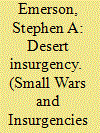

|
|
|
|
|
| Publication |
2011.
|
| Summary/Abstract |
This article provides an in-depth examination and analysis of the 2006-2009 Tuareg rebellion in Mali and Niger. It identifies the underlying reasons behind the rebellion, explores contrasting counter-insurgency (COIN) strategies employed by the two governments, and presents some lessons learned. While both COIN approaches ultimately produced similar peace settlements, the article argues that the Malian strategy of reconciliation combined with the selective use of force was far more effective than the Nigerien iron fist approach at limiting the size and scope of the insurgency and producing a more sustainable peace. It concludes by looking at the role of external actors, particularly the United States, and how the failure to internationalize the conflict was actually more beneficial to the local COIN effort, as well as to the longer strategic interests of the United States in the region.
|
|
|
|
|
|
|
|
|
|
|
|
|
|
|
|
| 7 |
ID:
111811
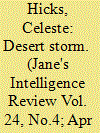

|
|
|
| 8 |
ID:
126444
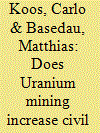

|
|
|
|
|
| Publication |
2013.
|
| Summary/Abstract |
We investigate whether uranium, similar to other resources, is associated with armed conflicts. The analysis uses grid cells in Africa to test this hypothesis. Results from logistic regressions reveal that uranium operations are not an independent conflict risk; however, it is significantly linked to local conflict events when interacting with ethnic exclusion. The analysis is supplemented by process tracing in four countries, where armed conflict broke out after uranium operations started (DR Congo, Central African Republic, Niger and South Africa). We find substantial evidence for a link only in the case of Niger. Our results suggest that uranium promotes intrastate conflict only under specific circumstances.
|
|
|
|
|
|
|
|
|
|
|
|
|
|
|
|
| 9 |
ID:
190677
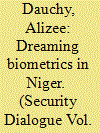

|
|
|
|
|
| Summary/Abstract |
Since 2015, Niger has been actively committed to migration control in West Africa in the context of the European Union Emergency Trust Fund for Africa. To enable better comprehension of the making of security in Niger, this article studies the implementation of biometrics under the EU Trust Fund by international agencies (Interpol, the International Organization for Migration, UNHCR) and national actors. Drawing on in-depth interviews, observation and anthropology of aid studies, I argue that biometrics is a travelling organizational model translated into a multiscalar process by state and non-state actors embedded in relations of power. Biometric technologies cannot be reduced to an added-value instrument for Nigerien authorities in order to enhance legibility, to better identify Nigeriens and foreigners crossing Niger’s borders within the free-movement area of ECOWAS (Economic Community of West African States). I focus on heterogeneous actors’ situated discourses and practices to demonstrate that they do not share the same dream about biometrics. In practice, however, biometrics helps international actors to produce their own security knowledge in Niger that, in the end, augments the capacity to trace ECOWAS citizens and reinforce the EU border regime.
|
|
|
|
|
|
|
|
|
|
|
|
|
|
|
|
| 10 |
ID:
175823
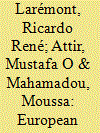

|
|
|
|
|
| Summary/Abstract |
European Union and Italian policies, while achieving their objectives of suppressing migration across the Mediterranean Sea, have at the same time created social and economic dislocation in southern Libya and northern Niger that will further destabilize the region. Using field research involving interviews and surveys, the authors document these dislocations, predict instability, and suggest future research.
|
|
|
|
|
|
|
|
|
|
|
|
|
|
|
|
| 11 |
ID:
188097
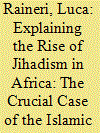

|
|
|
|
|
| Summary/Abstract |
While jihadism appears to be on the rise in Africa, the explanations of violent extremist groups’ capacity to foment jihadi insurgencies and mobilize recruits remain poorly understood. Recent studies have challenged the assumption that the rise of jihadism in Africa is the result of poor governance in areas of limited state reach, highlighting instead the significance of the (perception of) abuses perpetrated by state authorities. Looking at collective action and its structural determinants, it is rather state action—and not the lack thereof—that best explains the capacity of mobilization of jihadi insurgencies in African borderlands. In order to test this theory in a least-likely case, the article explores the genealogy and evolution of the Islamic State in the Greater Sahara (ISGS), mobilizing extensive qualitative evidence. Borrowing the analytical framework from civil war studies, it argues that the contentious political dynamics observed in Niger’s borderlands amount to a case of symmetric non-conventional warfare, where abuses perpetrated by state proxies trigger an escalation of homegrown terrorism. It therefore supplies a further specification of the theories investigating the complex interplay between the processes of jihadi mobilization/rebel governance and the practices of counter-terrorism in weak states.
|
|
|
|
|
|
|
|
|
|
|
|
|
|
|
|
| 12 |
ID:
193274
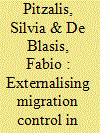

|
|
|
|
|
| Summary/Abstract |
The article investigates the role of the International Organization for Migration (IOM) in the global migration regime against the backdrop of the European Union (EU) border externalisation process in Niger. Over the last few years, UN agencies have been considered an essential component of the EU strategy to prevent irregular migrants from reaching Europe. Drawing on qualitative research and ethnographic fieldwork, combining empirical observation with critical analysis, we explore the ‘humanitarian–security nexus’ by focusing on the IOM's ‘humanitarian borderwork’ under the financial umbrella of the Emergency Trust Fund for Africa (ETFA). While the results of purely securitarian measures in Niger may have been ‘disappointing’, the outsourcing of migration management through IOM balances the interests of the Nigerien government and the EU. By focusing on IOM humanitarian operations and assisted voluntary returns and reintegration (AVRR) programmes, the article shows the further expansion of European humanitarian borders into the heart of the Sahel, highlighting new interdiction practices, hidden forms of deportation, side effects and contestation from below.
|
|
|
|
|
|
|
|
|
|
|
|
|
|
|
|
| 13 |
ID:
142394
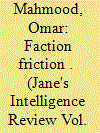

|
|
|
| 14 |
ID:
193147
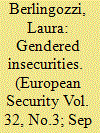

|
|
|
|
|
| Summary/Abstract |
What kind and whose security is the European Union concerned with in its gender practices in countering violent extremism? This article contributes to the scholarship on EU implementation of the Women, Peace and Security agenda and gender in countering violent extremism, highlighting shortcomings in the conceptualisation and practice of women’s participation in the security sphere. Taking Niger as a heuristic case study, the paper explores tensions between local gender norms and EU securitised framing of women’s empowerment and gender equality, arguing that women’s increased participation in the security field is tacitly understood in terms of use-value. Building on feminist postcolonial scholarship, the analysis uncovers how women are included and what expectations they are deriving from their engagement, exposing the neoliberal and neocolonial framings of EU intervention and the misunderstandings of women’s materialities. By ontologically flattening women subjectivities without accounting for their intersectional experiences, both patriarchy and global hierarchies of knowledge production are reiterated. In doing so, the EU co-constructs gendered and racialised subjects, thus reinforcing inequalities, silencing local pluralities, and in many cases, aggravating women’s situation of insecurity in Niger. The analysis employs feminist and ethnographic methods, including semi-structured interviews and participant observation.
|
|
|
|
|
|
|
|
|
|
|
|
|
|
|
|
| 15 |
ID:
151776
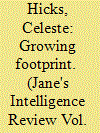

|
|
|
| 16 |
ID:
158479


|
|
|
|
|
| Summary/Abstract |
In recent years, Niger has gained prominence as a hub for the smuggling of migrants from West Africa to North Africa and Europe. Urged on by European concerns, Niamey has adopted repressive measures to contain such migrations in the region. These, however, have largely failed, and have yielded unintended and unexpected results, which challenge policy predictions. Drawing on extensive fieldwork, the article suggests that contradictory security imperatives have brought about the de facto regularisation of human smuggling. As a result, protection rackets sponsored by the state through patronage networks have severely limited the impact of externally sponsored measures to counteract irregular migration.
|
|
|
|
|
|
|
|
|
|
|
|
|
|
|
|
| 17 |
ID:
144400
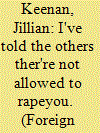

|
|
|
| 18 |
ID:
164146
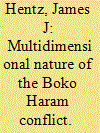

|
|
|
|
|
| Summary/Abstract |
The debate concerning the Nigerian terrorist Boko Haram is typically simplified across two false dichotomies. First, it is treated as either a local conflict in northeast Nigeria with its epicentre in Borno State or part of a broader conflict in Northwest Africa (and beyond), encompassing northern Cameroon, southern Chad, Niger, and reaching into Libya and Mali. The second dichotomy concerns whether it is animated by local material conditions on the ground, or is part of a broader anti-West jihad. The Boko Haram insurgency is not that simple. It is, rather, a multidimensional conflict and can change overtime.
|
|
|
|
|
|
|
|
|
|
|
|
|
|
|
|
| 19 |
ID:
089758
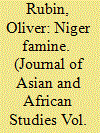

|
|
|
|
|
| Publication |
2009.
|
| Summary/Abstract |
By applying a widely accepted method for famine operationalization, the 2005 food crisis in Niger is categorized as a famine. This presents a unique opportunity to assess Amartya Sen's two most important famine contributions: (1) the entitlement framework for famine analysis; and (2) the hypothesis of a positive effect of democracy on famine protection. The fact that the Niger famine was caused by unfavorable terms of trade rather than a collapse in food production supports the focus of the entitlement framework on access to food; nevertheless, the belated and inadequate response to the crisis from the democratically elected Nigerien government appears to undermine the link between a pluralistic political system and effective famine protection.
|
|
|
|
|
|
|
|
|
|
|
|
|
|
|
|
| 20 |
ID:
164147


|
|
|
|
|
| Summary/Abstract |
This article discusses the shortcomings of the “de-radicalization doctrine” in sub-Saharan Africa. The issues raised are illustrated by the war against Boko Haram, which involves Nigeria, Niger, Chad and Cameroon. Relying on interviews with security officers, insurgents, civil servants, displaced people, humanitarian workers and Muslim and Christian clerics in Nigeria, Niger and Chad since 2005, the investigation shows that the four states focused on repression rather than demobilisation programs in prison or outdoors. The Boko Haram crisis is mainly a story of mismanagement. The article thus challenges the assumptions of the “de-radicalization doctrine” in Muslim Africa South of the Sahara. First, attempts to de-radicalize jihadi terrorists tend to focus too much on religious fanaticism and the exegesis of the Quran. Secondly, they are neither feasible nor efficient. Finally, they obscure priorities that are more important to counter extremism and demobilize insurgents.
|
|
|
|
|
|
|
|
|
|
|
|
|
|
|
|
|
|
|
|
|